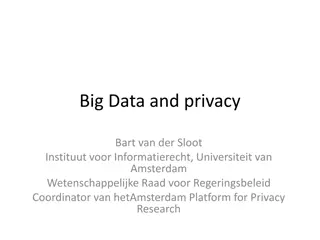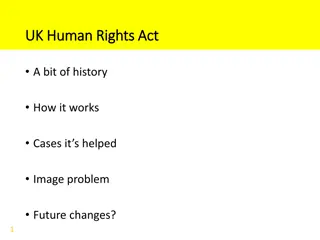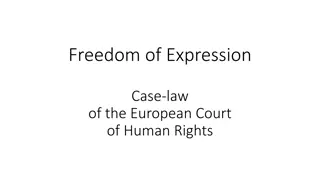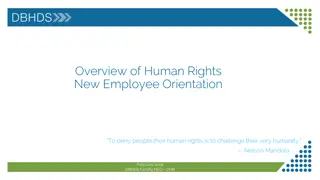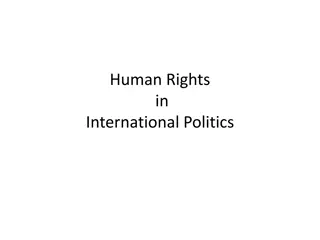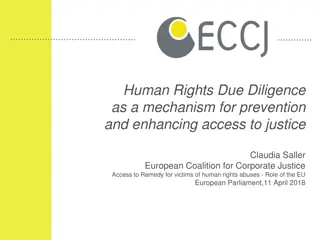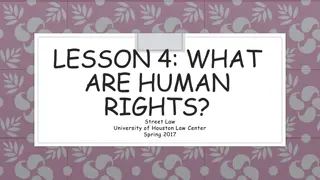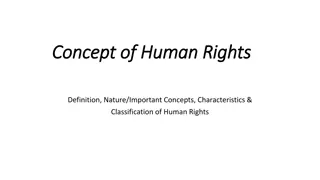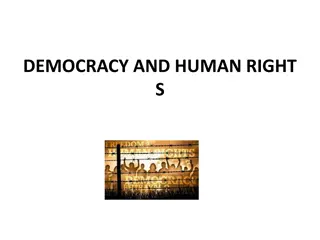Is the Human Rights Framework Adequate for the Big Data Era?
The discussion by Bart van der Sloot explores the compatibility of the human rights framework, especially the right to privacy under the ECHR, with the challenges posed by big data and mass surveillance. It delves into the ECtHR's approach to these issues and questions whether the current human rights framework is still suitable for the complexities of the Big Data era.
Uploaded on Sep 14, 2024 | 0 Views
Download Presentation

Please find below an Image/Link to download the presentation.
The content on the website is provided AS IS for your information and personal use only. It may not be sold, licensed, or shared on other websites without obtaining consent from the author. Download presentation by click this link. If you encounter any issues during the download, it is possible that the publisher has removed the file from their server.
E N D
Presentation Transcript
Is the Human Rights framework still fit for the Big Data era? Bart van der Sloot Institute for Information Law, UvA Amsterdam Platform for Privacy Research Scientific Council for Governmental Policy
Overview 1. Human rights, in particular the right to privacy, under the ECHR 2. Big Data/mass surveillance 3. The ECtHR s approach to Big Data/mass surveillance 4. Is the Human Rights framework still fit for the Big Data era?
(1) Human Rights: privacy ARTICLE 8 Right to respect for private and family life 1. Everyone has the right to respect for his private and family life, his home and his correspondence. 2. There shall be no interference by a public authority with the exercise of this right except such as is in accordance with the law and is necessary in a democratic society in the interests of national security, public safety or the economic wellbeing of the country, for the prevention of disorder or crime, for the protection of health or morals, or for the protection of the rights and freedoms of others.
(1) Human Rights: privacy (A) Individual right (subjective right of natural persons) ECtHR rejects: Class action/actio popularis ECtHR rejects: Legal persons as claimants (B) Individual interest ECtHR rejects: In abstracto claims ECtHR rejects: A-priori cases ECtHR rejects: Hypothetical complaints ECtHR rejects: claims about minimal harm (De minimis rule) ECtHR rejects: claims about societal interests > only individual interests: autonomy, freedom, dignity (C) Balancing of interests ECtHR approaches privacy and societal interests as relative Those interests are balanced and wheighed in concrete cases
(2) Big Data/mass surveillance Gathering mass data about unidentified people Without any preestablished goal > looking afterwards for statistical correlations Aggregated data and group profiles Used for general policies
(2) Big Data/mass surveillance (A) Claiming individual right is increasingly problematic Unaware Undoable (B) Specifying an individual interest is increasingly problematic Individual interest abstract and vague Rather at stake seem societal/group interests (C) Balancing interests is increasingly problematic Both interests are vague and abstract There also seem non-relative interests at stake
(3) The ECtHRs approach to Big Data/mass surveillance The ECtHR leaves its own focus on individual rights and personal interests in order to be able to assess cases concerning mass suveillance under Article 8 ECHR: In those cases specifically it does accept: Hypothetical complaints: reasonable likelihood A-Priori cases: chilling effect In abstracto claims: the mere existence of a law Legal persons as claimants Class actions Societal interest And does not engage in a balancing of interests, but uses a mere legal test is the mass surveillance program prescribed by law?
(3) The ECtHRs approach to Big Data/mass surveillance In these types of cases, what is at stake is: Not an individual right, but a general right Not an individual interest, but a general interest Not a balancing of interests, but a pure legal assessement
(4) Is the Human Rights framework still fit for the Big Data era? Big Data Problems: exist at a general level, affect societal interests and are based on aggregated data, statistical correlations and group profiles and are used for general policies Human Rights: are formulated as subjective rights of natural persons to protect their individual interests/personal data/focus on indivdiual harm













